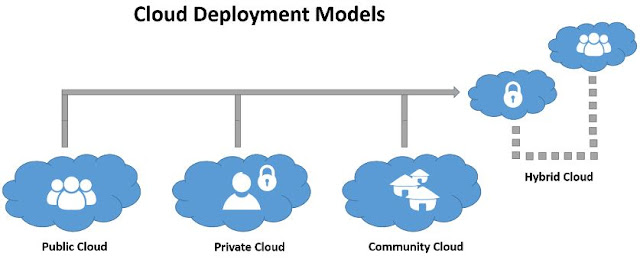
Introduction
Cloud Models can be based on the type of ownership or on the type of service they offer. Here we will discuss different types of Cloud Solutions based on Ownership and what each of them can do for the consumer.
More specifically, we will talk about the four following models:
• Private Cloud
• Community Cloud
• Public Cloud
• Hybrid Cloud
Different Cloud Models offer different options and benefits. It is vital to know which to pick before getting into Cloud Computing overall in order to make the right choice. Image source
The Private Cloud Model
Private Cloud Models are just that, private. Basically, they are a VIP type of model where only a select group of users can have access to it and know its location. This is preferred when the information that flows through is sensitive and needs to be kept private.
Private Cloud Models usually give a higher grade Security compared to its counterparts and are overall better optimized. Since most of the time they do not host a lot of users, performance is better as well.
This is preferable for governments and private companies in general because they can have their information on hand at all times in a generally secure way. If for some reason they also need to scale, it’s easiest with Cloud Computing due to its flexible nature.
Since in these kinds of models, you pay for what you use, it can be far more economical than owning & maintaining your own infrastructure.
The Community Cloud Model
Unlike the Private Cloud Model, this platform is shared among multiple organizations. As a multi-tenant environment, most features are shared with everyone. If security, for example, is on a certain base level, that is usually the case for every customer hosting there. This also refers to performance & privacy, although many times depending on how much the customer pays, there might be different custom options.
Usually, customers work in very similar areas. If let’s say this is the Financial Sector, most of them will want to be PCI DSS Compliant. If this platform, in general, offers that kind of Compliance, it would be natural for them to share such an environment.
These kinds of options & flexibility that cloud deployment models offer is the reason why Cloud Computing has taken off rather nicely as of late.
The Public Cloud Model
Public Cloud Models offer general and open use of your services. Basically whatever you host there should be available to most. Organizations that have decided to outsource their Infrastructure rather than keep it local have had huge benefits from the “pay as you use” types of model of Cloud Computing.
This type of model is used usually for building Social Networks, Storing Public Files such as Public Records or general collaborations between companies.
One of the best providers at the moment has got to be Amazon with their EC2 Instance model which makes it fairly easy to deploy and modify servers.
The Hybrid Cloud Model
The Hybrid Cloud Model is exactly what it says, a custom mixture of what the company needs. As an example, it can be a combination of all of the above-mentioned models.
For example, scientific-based companies can utilize private & public mixtures of Cloud Models. One for private research and the other for showing their results to the public. This is one situation where this cloud computing model would be acceptable.
This gives you the much-needed flexibility that a local Infrastructure can give, at a much lower cost and a lot greater maintenance system.
Conclusion
Overall we have discussed the biggest Cloud Models that are currently offered and what they can provide for the end user. Each has their own pros and cons and hopefully, your organization will choose the right one.
By offering a highly optimized, secure & flexible environment, Cloud Computing continues to soar even further.
I hope you enjoyed this blog post about the best cloud computing models based on ownership.
Interested in more articles about cloud computing technology?
Read Related Resources:
• The Complete Guide To Small Business Cloud Computing
• Cloud Computing Personal Security Basics
More Bootstrap Business Blog Below